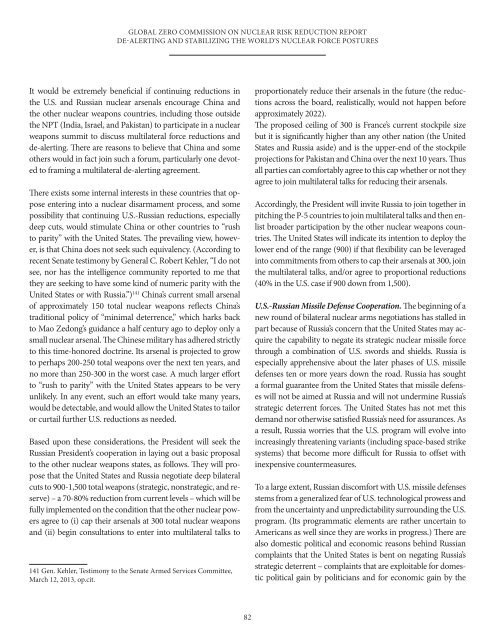global_zero_commission_on_nuclear_risk_reduction_report
global_zero_commission_on_nuclear_risk_reduction_report
global_zero_commission_on_nuclear_risk_reduction_report
Create successful ePaper yourself
Turn your PDF publications into a flip-book with our unique Google optimized e-Paper software.
GLOBAL ZERO COMMISSION ON NUCLEAR RISK REDUCTION REPORTDE-ALERTING AND STABILIZING THE WORLD’S NUCLEAR FORCE POSTURESIt would be extremely beneficial if c<strong>on</strong>tinuing reducti<strong>on</strong>s inthe U.S. and Russian <strong>nuclear</strong> arsenals encourage China andthe other <strong>nuclear</strong> weap<strong>on</strong>s countries, including those outsidethe NPT (India, Israel, and Pakistan) to participate in a <strong>nuclear</strong>weap<strong>on</strong>s summit to discuss multilateral force reducti<strong>on</strong>s andde-alerting. There are reas<strong>on</strong>s to believe that China and someothers would in fact join such a forum, particularly <strong>on</strong>e devotedto framing a multilateral de-alerting agreement.There exists some internal interests in these countries that opposeentering into a <strong>nuclear</strong> disarmament process, and somepossibility that c<strong>on</strong>tinuing U.S.-Russian reducti<strong>on</strong>s, especiallydeep cuts, would stimulate China or other countries to “rushto parity” with the United States. The prevailing view, however,is that China does not seek such equivalency. (According torecent Senate testim<strong>on</strong>y by General C. Robert Kehler, “I do notsee, nor has the intelligence community <strong>report</strong>ed to me thatthey are seeking to have some kind of numeric parity with theUnited States or with Russia.”) 141 China’s current small arsenalof approximately 150 total <strong>nuclear</strong> weap<strong>on</strong>s reflects China’straditi<strong>on</strong>al policy of “minimal deterrence,” which harks backto Mao Zed<strong>on</strong>g’s guidance a half century ago to deploy <strong>on</strong>ly asmall <strong>nuclear</strong> arsenal. The Chinese military has adhered strictlyto this time-h<strong>on</strong>ored doctrine. Its arsenal is projected to growto perhaps 200-250 total weap<strong>on</strong>s over the next ten years, andno more than 250-300 in the worst case. A much larger effortto “rush to parity” with the United States appears to be veryunlikely. In any event, such an effort would take many years,would be detectable, and would allow the United States to tailoror curtail further U.S. reducti<strong>on</strong>s as needed.Based up<strong>on</strong> these c<strong>on</strong>siderati<strong>on</strong>s, the President will seek theRussian President’s cooperati<strong>on</strong> in laying out a basic proposalto the other <strong>nuclear</strong> weap<strong>on</strong>s states, as follows. They will proposethat the United States and Russia negotiate deep bilateralcuts to 900-1,500 total weap<strong>on</strong>s (strategic, n<strong>on</strong>strategic, and reserve)– a 70-80% reducti<strong>on</strong> from current levels – which will befully implemented <strong>on</strong> the c<strong>on</strong>diti<strong>on</strong> that the other <strong>nuclear</strong> powersagree to (i) cap their arsenals at 300 total <strong>nuclear</strong> weap<strong>on</strong>sand (ii) begin c<strong>on</strong>sultati<strong>on</strong>s to enter into multilateral talks to141 Gen. Kehler, Testim<strong>on</strong>y to the Senate Armed Services Committee,March 12, 2013, op.cit.proporti<strong>on</strong>ately reduce their arsenals in the future (the reducti<strong>on</strong>sacross the board, realistically, would not happen beforeapproximately 2022).The proposed ceiling of 300 is France’s current stockpile sizebut it is significantly higher than any other nati<strong>on</strong> (the UnitedStates and Russia aside) and is the upper-end of the stockpileprojecti<strong>on</strong>s for Pakistan and China over the next 10 years. Thusall parties can comfortably agree to this cap whether or not theyagree to join multilateral talks for reducing their arsenals.Accordingly, the President will invite Russia to join together inpitching the P-5 countries to join multilateral talks and then enlistbroader participati<strong>on</strong> by the other <strong>nuclear</strong> weap<strong>on</strong>s countries.The United States will indicate its intenti<strong>on</strong> to deploy thelower end of the range (900) if that flexibility can be leveragedinto commitments from others to cap their arsenals at 300, jointhe multilateral talks, and/or agree to proporti<strong>on</strong>al reducti<strong>on</strong>s(40% in the U.S. case if 900 down from 1,500).U.S.-Russian Missile Defense Cooperati<strong>on</strong>. The beginning of anew round of bilateral <strong>nuclear</strong> arms negotiati<strong>on</strong>s has stalled inpart because of Russia’s c<strong>on</strong>cern that the United States may acquirethe capability to negate its strategic <strong>nuclear</strong> missile forcethrough a combinati<strong>on</strong> of U.S. swords and shields. Russia isespecially apprehensive about the later phases of U.S. missiledefenses ten or more years down the road. Russia has soughta formal guarantee from the United States that missile defenseswill not be aimed at Russia and will not undermine Russia’sstrategic deterrent forces. The United States has not met thisdemand nor otherwise satisfied Russia’s need for assurances. Asa result, Russia worries that the U.S. program will evolve intoincreasingly threatening variants (including space-based strikesystems) that become more difficult for Russia to offset withinexpensive countermeasures.To a large extent, Russian discomfort with U.S. missile defensesstems from a generalized fear of U.S. technological prowess andfrom the uncertainty and unpredictability surrounding the U.S.program. (Its programmatic elements are rather uncertain toAmericans as well since they are works in progress.) There arealso domestic political and ec<strong>on</strong>omic reas<strong>on</strong>s behind Russiancomplaints that the United States is bent <strong>on</strong> negating Russia’sstrategic deterrent – complaints that are exploitable for domesticpolitical gain by politicians and for ec<strong>on</strong>omic gain by the82


